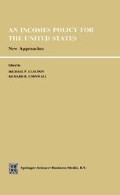Abstract
The substantial inflation we have experienced for more than ten years now has been remarkably stubborn. This may suggest that it is not just the result of a temporary lapse in macropolicy or of OPEC’s misbehavior, but that it is the payoff of following employment-oriented policies rather than price level-oriented policies. Once the public realizes that the government will try to keep recessions short, it responds to falling demand, not by reducing prices, but by reducing output.1 Since the public knows better than to trust the government’s statements about what it will do and learns only by experience, a mere announcement that the government will now no longer tolerate inflation would not suffice, and it would take a long and severe recession to bring the inflation rate down substantially by monetary and fiscal policies. Hence, it is not surprising that incomes policies have been advocated. But traditional incomes policies have compiled a sorry record both in the United States and in foreign countries, so that there is much to be said for trying to develop new kinds. This is so regardless of whether one believes that the causes of inflation are to be found in “demand-pull or in “cost-push.” Even if an inflation is due entirely to demand-pull, it could take a great deal of unemployment to eliminate it by demand management if firms and labor expect that aggregate demand will soon become excessive again.
Access this chapter
Tax calculation will be finalised at checkout
Purchases are for personal use only
Preview
Unable to display preview. Download preview PDF.
References
Ackley, Gardner. “Okun’s New Tax-Based Incomes-Policy Proposal.” Economic Outlook 5 (Winter 1978 ): 8–9.
“Symposium.” Brookings Papers on Economic Activity, 1978:2, pp. 507–23.
Cagan, Phillip. “The Reduction of Inflation by Slack Demand.” In Contemporary Economic Problems. Edited by William Fellner. Washington, D.C.: American Enterprise Institute, 1978, pp. 13–45.
Dildine, Larry, and Sunley, Emil. “Administrative Problems of Tax Based Incomes Policies.” Brookings Papers on Economic Activity, 1978: 2, pp. 363–90.
Fogarty, Michael. “Fiscal Measures and Wage Settlements.” British Journal of Industrial Relations 11 (March 1973): 29–61.
Gordon, Robert J. “Comment.” Brookings Papers on Economic Activity, 1978: 2, pp. 349–53.
Kotowitz, Yehuda, and Portes, Richard. “The ‘Tax on Wage Increases.’” Journal of Public Economics 3 (1974): 113–32.
Latham, R.W., and Peel, D.A. “The Tax on Wage Increases’ When the Firm Is a Monopsonist.” Journal of Public Economics 8 (October 1977): 247–53.
Lerner, Abba. “A Wage-Increase Permit Plan to Stop Inflation.” Brookings Papers on Economic Activity, 1978: 2, pp. 491–505.
Lucas, Robert. “Understanding Business Cycles.” Carnegie-Rochester Conference Series on Public Policy 5 (1977): 31–68.
Mitchell, Daniel. “Comment.” Brookings Papers on Economic Activity, 1978: 2, pp. 478–82.
Okun, Arthur. “Discussion.” Brookings Papers on Economic Activity, 1978: 2, pp. 353–57.
The Great Stagflation Swamp.’’ Challenge (November-December 1977):613.
Poole, William. “Discussion.” Brookings Papers on Economic Activity, 1978: 2, p. 399.
Reese, Albert. “New Policies to Fight Inflation: Sources of Skepticism.” Brookings Papers on Economic Activity, 1978: 2, pp. 453–77.
Seidman, Laurence. “Tax-Based Incomes Policies.” Brookings Papers on Economics Activity, 1978: 2, pp. 301–49.
“Would Tax Shifting Undermine the Tax Based Incomes Policy?” Journal of Economic Issues 3 (September 1978):647–76.
Tobin, James. “How Dead is Keynes?” Economic Inquiry (1977): 459–68.
Ulman, Lloyd. “Comment.” Brookings Papers on Economic Activity, 1978: 2, pp. 483–88.
Wallich, Henry, and Weintraub, Sidney. “A Tax-Based Incomes Policy.” Journal of Economic Issues 5 (1971): 1–19.
Weintraub, Sidney. Capitalism’s Inflation and Unemployment Crisis. Reading, Mass.: Addison-Wesley, 1978.
Editor information
Editors and Affiliations
Rights and permissions
Copyright information
© 1981 Springer Science+Business Media Dordrecht
About this chapter
Cite this chapter
Mayer, T. (1981). Innovative Incomes Policies: A Skeptic’s View . In: Claudon, M.P., Cornwall, R.R. (eds) An Incomes Policy for the United States. Springer, Dordrecht. https://doi.org/10.1007/978-94-009-8763-0_10
Download citation
DOI: https://doi.org/10.1007/978-94-009-8763-0_10
Publisher Name: Springer, Dordrecht
Print ISBN: 978-94-009-8765-4
Online ISBN: 978-94-009-8763-0
eBook Packages: Springer Book Archive

